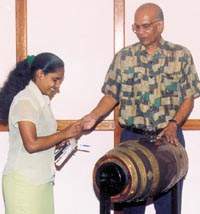|
Peace
and business - no crystal ball to forecast future
Chandra
Jayaratne, former chairman of the Chamber of Commerce and currently
Managing Director of Eagle Insurance (Pvt) Ltd, was of the view
that the private sector should not waste any time in investing in
the north. Raaj de Silva,
Managing Director of Lanka Orix Leasing Company (LOLC), said local
businesses' need to change their culture under any 'post-peace'
situation in the country. In a unique
departure from traditional norms, an attempt was made to pick, lottery-style,
a third panellist from among the members. Patrick Amarasinghe,
veteran businessman and chamber personality, helped to pick a panellist
but the three names picked were not present. Club member Janaka
Jayasuriya then volunteered to serve on the panel. Jayaratne said
it was the duty of the private sector to create new paradigms in
all the key sectors of the economy if Sri Lanka is to remain competitive
in the world market. He referred to eight new paradigms that the
business community should think about seriously. "Peace
is a dividend, which we must earn rather than expect. So far the
private sector has been satisfied in playing it safe, by making
minimum risk investments and paying low wages. However, if
we do not make a new paradigm, foreign investors may take over our
industries and run away with our economy". He highlighted
the plight of the plantation sector, which has declined from an
export front liner to a virtual small-scale industry. With the number
of exporters in the world market increasing over the years it is
only a matter of time before the quality of Sri Lankan tea is surpassed
by its Asian competitors, the former chamber chief, who has spearheaded
a reforms agenda at the chamber, said. Jayaratne referred
to rising labour costs and said the industry may be forced to import
cheaper labour once again from South India which provided tea and
rubber labour during colonial times. LOLC's De Silva
said the opening out of the north and the east was unlikely to raise
any new sectors and noted that in a peace scenario, companies that
"often blamed the war for losses in their accounts" would
now run out of such options. "We survived
the war because we were cost-effective. But we were more inward-looking
and during this period of self-absorption our neighbouring countries
moved forward." De Silva was
also of the view that it is necessary to use Tamil language in business
dealings and in this context suggested that consumer advertisements
should reflect a feeling of oneness. Nalin Attygalle,
a marketing expert, showed a couple of creative advertisements on
a TV screen on the importance of peace and said: "Many companies
in the private sector wait for the government to do all the hard
work in establishing a lasting peace - without lending a hand. Later
they reap the benefits. The private sector too has a social responsibility
towards restoring peace in this country." During a vibrant
discussion that followed some members were of the view that no regular
investment is possible in the north-east until an interim administration
is in place because of taxes levied by the LTTE. But Jayaratne
believed the private sector should use the opportunity to "invest
for tomorrow" while being prepared to take risks in the hope
that an interim administration would be set up." Answering a
question from a member on whether the LTTE is justified in taxing
the people, Jayaratne was of the view that the war was a source
of livelihood to many of the LTTE cadres - like many low-income
members of the armed forces - and they needed money to support their
families. Club President
Romesha Wijesuriya, who moderated the discussion, said the club
was planning an outing for its members, launching a monthly newsletter,
having a new data base and a social services project to coincide
with the Country Road music children's charity concert in collaboration
with The Sunday Times newspaper. She also urged members to be punctual
and attend meetings regularly with a gentle warning that "those
who are absent on two or three consecutive occasions are likely
to have their membership cancelled." (Reported by Thushara Matthias, Rajika Chelvaratnam and Suren Gnanaraj). |
||||
Copyright © 2001 Wijeya Newspapers
Ltd. All rights reserved. |
